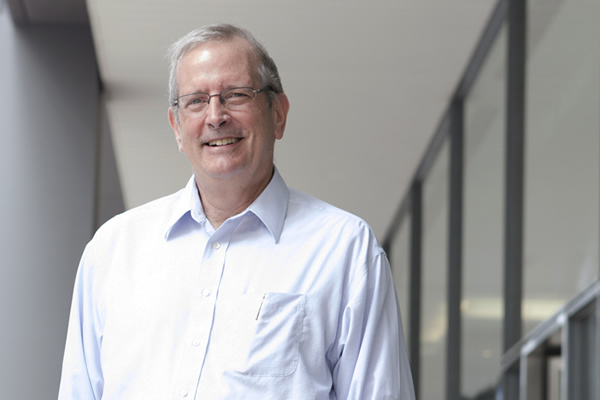Rev. Craig Mousin - Organizational Ombudsperson

Rev. Craig is also a lawyer, ordained Protestant minister; and an advocate for refugee rights. He was hired as the university’s first organization ombudsperson in 2001. Craig has worked at the university for 26 years.
Craig has a quote on his wall that's part of DePaul’s mission: “…the DePaul community is above all characterized by ennobling the God-given dignity of each person.”
What does an organizational ombudsperson (ombuds, for short) do?
An ombudsperson is a designated neutral party who is appointed or employed by an organization to facilitate the informal resolution of concerns of employees, managers and faculty.
The university has a variety of resources to help its faculty and staff when something isn’t going according to plan and policy, such as Human Resources (Employee Relations and Engagement) or the Office of Institutional Diversity and Inclusion (OIDE). Craig’s office provides one alternative resource.
Perhaps a faculty or staff member has a problem with a supervisor or a question about university policy. Similarly, a supervisor or a department chair may seek assistance with a particular issue. Craig serves as an independent, neutral and confidential source to help people work through these issues. They can go to Craig with a concern, and figure out what resources they can use within the university to address it confidentially.
Craig’s office can be a great first step when difficulties arise. He can help to shine light on the policies and resources available to employees in times of need. “I’m not here to challenge your truth. I accept your truth as your truth,” Craig explains. “It’s not my job to act as a judge or an arbitrator.” Although he doesn’t make formal findings, Craig will ask about policies and whether they were properly implemented.
“Because the ombuds cannot make decisions about the eventual outcome of a dispute, part of his responsibility is to help all parties work within policies and procedures to resolve disputes, whether it is through clarification of policies, inspiring new policies or mediation. But I also help people become better advocates for themselves or seek resources within the university, whether it be other individuals or policies that clarify complicated situations.” He often hands out the book
Difficult Conversations as a resource. He seeks opportunities to help people speak up in a way that contributes to making the university better while also addressing their individual concerns.
There’s a quote from DePaul’s mission on his wall that Craig likes to reference: “The DePaul community is above all characterized by ennobling the God-given dignity of each person.”
This isn’t just a saying for Craig. It’s a part of his own mission.
As an ordained Protestant minister and lawyer, he leverages his ministerial and law backgrounds to aid refugees seeking asylum from violence and oppression. “I have been working with refugees and organizations that represent them for 30 years. I still teach asylum and refugee law at the law school.”
Before he came to DePaul, Craig was the director of the Midwest Immigrant Rights Center (MIRC). “Our plan called for establishing a pro bono legal advocacy group that represented refugees in asylum procedures. At first, we developed a Chicago program that recruited lawyers to represent refugees in the 80’s and 90’s for Central Americans fleeing violence and civil wars. The program, now called the National Immigrant Justice Center, has grown and represents refugees seeking safety from nations all over the world.”
After six years at MIRC, he was offered the position of director of the Center for Church/State Studies in DePaul’s College of Law. “One of the reasons I came to DePaul was to teach refugee and immigration law, while also exploring the relationship of law and religion.” Craig was given the opportunity to further study his passion and teach it. He spent 11 years at the Center for Church/State Studies. Eventually, he became the university’s first organizational ombudsperson.
DePaul University is an ideal fit for Rev. Craig Mousin. He has studied Vincentian heritage and written extensively about the topic. “I have been able to research and write about how some of those who have come before us in this Vincentian tradition have interpreted the Vincentian legacy in the face of contemporary challenges.”
He incorporates this Vincentian legacy into his own work. Craig explains, “The responsibility as a manager is, above all, to ennoble dignity and help employees flourish. If that happens, we will have a more productive workplace that enables all to help fulfill the Vincentian mission.”
Through his work as an ombudsperson, minister and advocate for social justice, Craig Mousin carries out his personal mission on a daily basis.